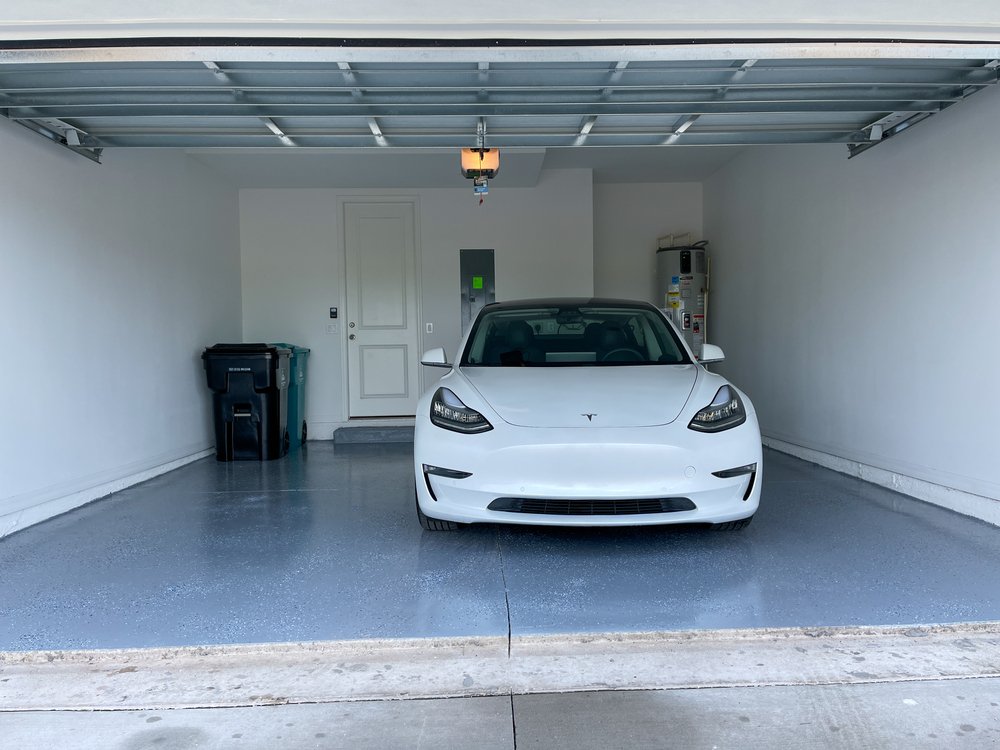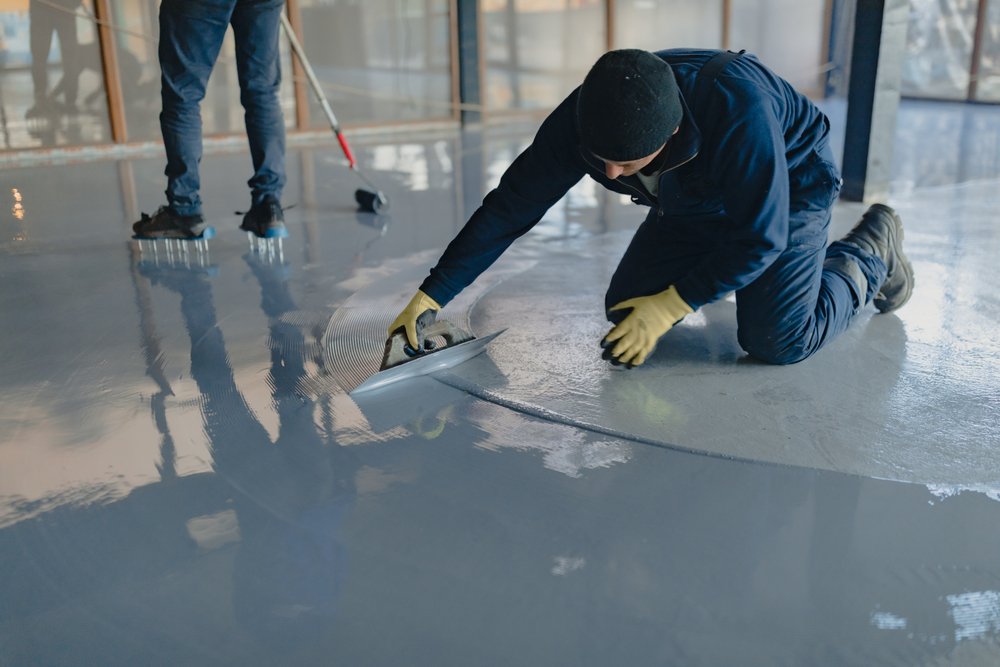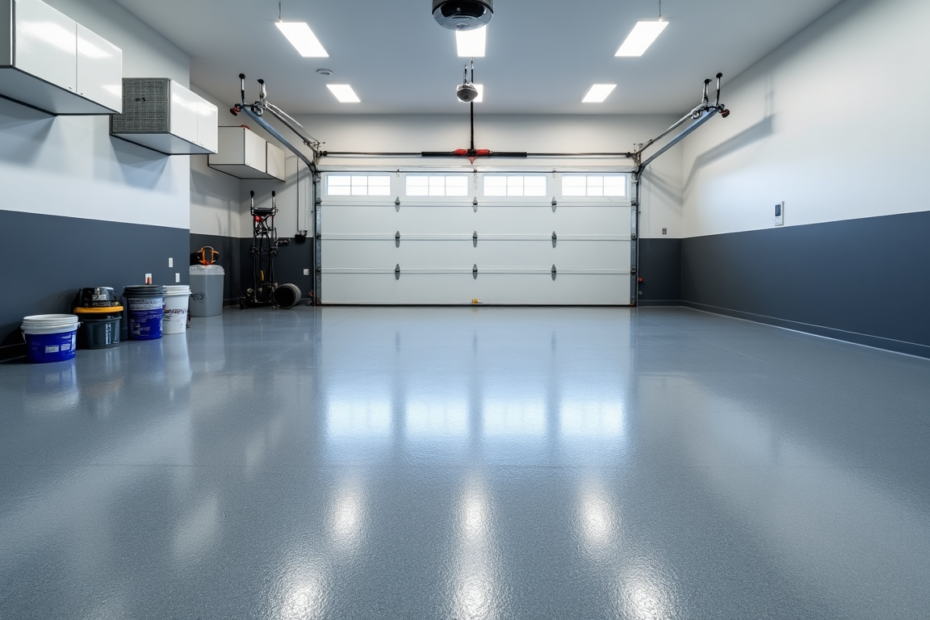Epoxy garage floor installations ranges from $1,595 to $3,337, and most homeowners pay around $2,441 for a complete project. This might seem like a major investment, but an epoxy floor that’s managed to keep in good condition can last up to 20 years.
The price per square foot typically falls between $3 and $12 with installation fees included. Many factors affect the final cost, from garage size to material quality. Your project budget needs careful planning since labor expenses alone can take up to 65% of the total cost.
Our 2024 guide breaks down what you should expect to pay for your epoxy garage floor coating. You’ll find detailed information about material costs, labor rates and hidden expenses. The guide also shows practical ways to save money without cutting corners on quality.
Current Epoxy Garage Floor Costs in 2024
Professional epoxy floor installers report diverse price ranges throughout the US for 2024.
National average costs
The cost to install a professional epoxy garage floor ranges between $1,595 and $3,337, with most homeowners paying around $2,441. A standard two-car garage costs between $1,600 and $5,800. Larger three-car garages need an investment of $2,300 to $8,600.
Regional price variations
Your location plays a major role in determining epoxy flooring costs:
| City | Average Cost Range |
|---|---|
| New York City | $1,705 to $3,720 |
| Los Angeles | $1,395 to $3,010 |
| Chicago | $1,685 to $2,825 |
| Dallas | $1,340 to $2,440 |
| Miami | $1,240 to $2,685 |
Labor rates, material availability, and local market conditions create these price differences. Urban areas tend to have higher prices than suburban locations.

Cost per square foot breakdown
A complete installation costs between $4 to $10 per square foot. This total price has two main parts:
Materials range from $1 to $5 per square foot, based on your epoxy choice:
- Water-based epoxy: $30 to $50 per gallon
- Solvent-based epoxy: $40 to $55 per gallon
- Solid epoxy: $45 to $150 per gallon
Labor costs run $3 to $5 per square foot. This makes up about 65% of the project’s total cost. Professionals usually need three days to finish the job – one day each to prepare, coat, and seal the floor.
Square footage affects your overall cost. Larger areas often cost less per square foot. This happens because fixed costs like equipment and setup spread across more space.
What Affects Your Epoxy Floor Coating Cost
You just need to understand a few key things that affect your epoxy garage floor cost to make smart decisions about your investment.
Garage size impact
Square footage is the main factor that determines costs. A single-car garage (240 square feet) costs between $720 and $2,900, while a three-car garage costs $1,700 to $9,500. Larger projects can save you money because fixed costs get spread across more square footage.
Material quality differences
The type and quality of epoxy materials have a big effect on your final cost:
| Epoxy Type | Cost per Gallon | Coverage |
|---|---|---|
| Water-based | $30 – $50 | 80-200 sq ft |
| Solvent-based | $40 – $55 | 80-200 sq ft |
| Solid epoxy | Up to $150 | 80-200 sq ft |
Better quality materials give you improved durability and chemical resistance, especially in areas with heavy traffic or exposure to automotive fluids. Professional-grade epoxy systems last 10-20 years, while DIY kits might need replacement after 1-2 years.
Labor costs in your area
Professional installation rates change based on where you live and how complex your project is. Labor makes up 33% to 60% of the total project cost, with rates from $50 to $150 per hour. Most companies send two professionals to complete the installation.
These factors affect labor expenses:
- Project complexity and floor preparation requirements
- Local market conditions and contractor availability
- Accessibility of the installation site
- Current condition of the concrete surface
Urban areas usually cost more than suburban locations. You might pay premium prices in densely populated areas due to higher operational costs and increased demand for professional services.
Types of Epoxy and Their Prices
The type of epoxy you choose affects both your immediate costs and long-term value. Let’s get into the main options you have for garage floor coatings.
Water-based epoxy costs
Water-based epoxy ranks as the most affordable choice, with prices ranging from $30 to $50 per gallon. This budget-friendly option combines water, epoxy, and hardener components. You can cover about 160 square feet with a single gallon.
The attractive price tag comes with some important points to note:
- You’ll need to reapply every 1 to 3 years
- It resists minor scratches and chemical exposure
- The low VOC emissions make it eco-friendly
- You can apply it on slightly damp surfaces
Solid epoxy pricing
Solid epoxy prices range from $45 to $150 per gallon, and these higher costs reflect its superior quality. This professional-grade solution gives you twice the thickness of water-based options.
Solid epoxy’s higher price tag brings several advantages:
- It lasts up to 20 years with proper care
- You get reliable resistance against heat, chemicals, and scratches
- Zero VOCs support environmental sustainability
A comparison of key characteristics:
| Feature | Water-Based | Solid |
|---|---|---|
| Cost per Gallon | $30-$50 | $45-$150 |
| Durability | 1-3 years | Up to 20 years |
| Application | DIY-friendly | Professional installation recommended |
| Coverage per Gallon | 160 sq ft | 160 sq ft |
Solid epoxy applications need professional installation because the material demands quick and precise application techniques. Most epoxy floors start at 10 millimeters thick, though residential applications can reach up to 250 millimeters for improved durability.
DIY enthusiasts looking at water-based options can find retail kits priced between $100 and $600. In spite of that, these systems usually don’t last as long and need replacement within one to two years.

Hidden Costs to Watch For
Many homeowners don’t realize how much preparation work their garage floor needs before applying epoxy. These unexpected costs can really add up and affect your project budget.
Floor preparation expenses
You need professional surface preparation that involves multiple steps and costs. A full assessment of the surface costs between $200 and $500. This helps identify any problems that could stop the epoxy from sticking properly.
Surface preparation methods and their costs include:
- Acid etching chemicals: $20 per application
- Sandblasting: $1 to $5 per square foot
- Power washing and cleaning: $50 to $100
Moisture testing is a vital step that people often skip. This test prevents future adhesion problems and costs $200 to $500 per assessment. Your epoxy floor might bubble or peel without proper moisture evaluation.
Repair costs before installation
You must fix any existing floor damage first. Small crack and chip repairs cost between $6 and $14 per square foot. Simple concrete patching ranges from $25 to $250.
Major foundation problems need bigger investments:
- Foundation repairs: $2,200 to $7,800
- Concrete resurfacing: $1,000 to $5,000
- Vapor barriers (if needed): $4 per square foot
The following table shows preparation costs based on surface condition:
| Surface Condition | Preparation Level | Average Cost Impact |
|---|---|---|
| Excellent (minimal cracks) | Basic prep only | $1-2/sq ft |
| Good (minor cracks) | Moderate repairs | $2-3/sq ft |
| Poor (extensive damage) | Major repairs | $3-5/sq ft |
Storage costs are another hidden expense during installation. A storage unit for your garage items costs at least $100. Professional contractors will ask you to empty the garage completely before they start work.
Proper surface preparation will give your epoxy floor coating a longer life. You might save money by skipping these significant steps at first, but this leads to premature wear, bubbling, or complete floor failure. Budget for these preparation expenses to ensure your epoxy garage floor installation succeeds.
Ways to Save on Your Epoxy Floor
Smart planning and strategic decisions can save you money on your epoxy garage floor without cutting corners on quality.
Best time to install
The right timing makes a big difference in both cost and quality of your epoxy floor installation. Spring and fall work best since temperatures stay between 55 and 90 degrees Fahrenheit. These mild conditions let epoxy coatings cure perfectly.
You might get better deals if you schedule the work in late fall or winter. Many contractors lower their prices when business slows down. The concrete temperature needs to stay above 55 degrees Fahrenheit for the epoxy to set properly. This makes a temperature-controlled space vital for winter installations.
Contractor negotiation tips
Good research and smart negotiation help you get competitive rates. Start by getting multiple estimates from reliable concrete flooring companies. Most contractors give free estimates, but it’s good to check this first.
These negotiation strategies work well:
- Research current market rates in your area
- Collect at least three detailed quotes from different contractors
- Focus on the total project cost rather than individual components
- Request documentation of insurance, licenses, and previous work samples
- Discuss potential package deals or bundled services
Contractors often show flexibility with pricing. You can save up to 20% through negotiations. Success depends on knowing the contractor’s expertise and portfolio while keeping communication respectful.
DIY vs Professional Installation
Your choice between DIY and professional installation affects both immediate costs and long-term value. Here’s a detailed comparison:
| Aspect | DIY Installation | Professional Installation |
|---|---|---|
| Cost Range | $2-$5 per sq ft | $5-$12 per sq ft |
| Initial Investment | $50-$200 per kit | $2,000-$6,000 for two-car garage |
| Required Tools | Power washers, rollers, protective gear | Included in service |
| Durability | 1-2 years | Up to 20 years |
| Application Time | Variable | 2-3 days average |
DIY epoxy floor kits help you save money right away. They cost between $3 and $12 per square foot. But these savings come with extra work. You’ll need special tools like power washers, spiked rollers, shop vacuums, and protective equipment.
Professional installations cost more upfront but save money over time. Expert contractors have the tools and know-how to apply epoxy correctly. Their work gives you better chemical resistance and curing quality, which means your floor lasts longer.
You can cut costs by getting the garage ready yourself. Clear out the space, move vehicles, and clean surface contaminants. This prep work reduces labor costs while keeping installation quality high.
Conclusion
Epoxy garage flooring represents one of the most important home improvement investments you can make. Professional installations deliver lasting results, and these floors can serve homeowners for up to 20 years with proper maintenance.
Homeowners can save money by choosing the right timing and researching contractors carefully. Installation works better during fall and spring, while winter bookings often come with lower rates. DIY options might seem cheaper at first, but professional installations usually provide more economical solutions in the long run.
Your floor’s longevity depends on proper surface preparation. A budget that includes moisture testing, repairs, and preparation work prevents expensive issues down the road. A well-planned epoxy garage floor project combines quality materials with expert installation to create a durable surface that improves your garage’s value for years to come.
